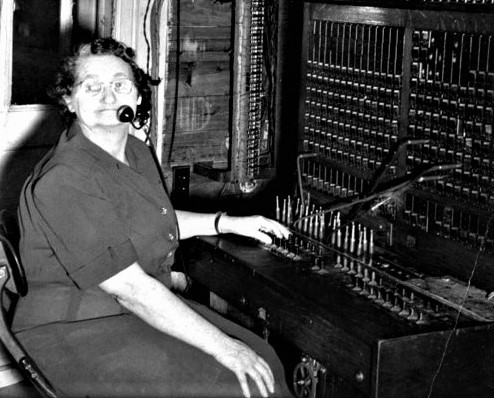In 1918, the United States War Department hired and sent a contingent of female switchboard operators to France. Their job was to accompany the American Expeditionary Forces to Europe to translate information and communicate command orders to the troops on the front lines. These women, experts in their technology, could connect a call in 10 seconds and soon became known as the “Hello Girls.”
The history of Concord would not be complete without including a story about our own “Hello Girl,” Reatha Jackson Hammonds (1889-1976). Mrs. Hammonds and her husband, Simuel Henry “Sim” Hammonds, provided the first telephone service to the Concord community from circa 1912-1954.

Reatha Hammond working through a storm. Photo from Knoxville News Sentinel July 1, 1952
The two worked as a pair. Mr. Hammonds installed and maintained the telephone lines by stringing them through trees, fence lines or wherever he could manage to place them. Mrs. Hammonds ran the switchboard initially from a building on Front Street and later moved it to a room in their home on Third Drive. If that were not enough to keep them busy, they managed to have 10 children including a set of twins and a set of triplets. Six of the children grew to become adults, and Mrs. Hammonds continued to take care of her grandchildren while still running the switchboard.
The early equipment for Concord Telephone consisted of a wooden crank-style telephone, and most people shared a line. Each person had a different ring (one short, one long, etc.) and Mrs. Hammonds had to remember the ring combination for each party member. If one needed to use the telephone and could hear a conversation upon lifting the receiver, they would quietly hang up and wait for the other person to complete their call. It was not considered proper to listen in on other’s private conversations.
One story that surfaces often about Reatha involved a young girl who was dating two men. The young girl was careful not to let each of the two men know that she was seeing the other. Unfortunately, one of the men called for his girlfriend and Reatha promptly related that she was out with the other fella. Oops.
It seems that Reatha was so good at her job in monitoring the conversations of the customers that she became invaluable to Dr. Malcolm Cobb as his unofficial answering service. Dr. Cobb’s home (and home office) was visible from the window of the Hammonds’ home, and she was able to tell those needing the good doctor that he was away from the office and would promptly deliver the message to him on his return home.
Concord Telephone Company was sold in 1950 to a contingent of 85 stockholders but the Hammonds maintained the business from their home until 1954 when the service was updated with a rotary dial system, and it became Concord Telephone Exchange. Telephone and Data Systems Inc. (TDS) acquired the Exchange in 1975.

The Hammonds house still sits on Third Drive in Concord.
Parallels with the “Hello Girls” and Reatha were similar: the jobs were dangerous as they ran wires through the trenches to the front lines; Mr. Hammonds ran wires through the trenches to the community. In 1952, a bad storm blew the roof off the Hammonds’ home, but Mrs. Hammonds, not to be deterred, continued to operate the switchboard in the rain while her daughter-in-law mopped rainwater in the house.
The “Hello Girls” were denied discharge papers and not recognized as veterans. The women’s suffrage movement in 1919 encouraged President Woodrow Wilson to support legislation giving due respect and credit, but it was not until 1977 when a bill passed that did recognize them as veterans. In 2021 legislation was introduced to award a single Congressional Gold Medal to the Signal Corps Female Telephone Operators Unit.
Mrs. Hammonds has gone to her heavenly reward, but long-time residents still remember her and her many talents: her devotion at the switchboard, her spunk, her out of this world chocolate caramel cake, and her green thumb. If you were fortunate enough to drop buy, you weren’t leaving without a huge piece of cake and a “start” from one her prize violets. We remember and salute you, Reatha, for a job well done!
Source contributions: Fold3.com “World War I Hello Girls” by Jenny Ashcraft
Mona Isbell Smith is a retired computer systems analyst who enjoys freelancing.

